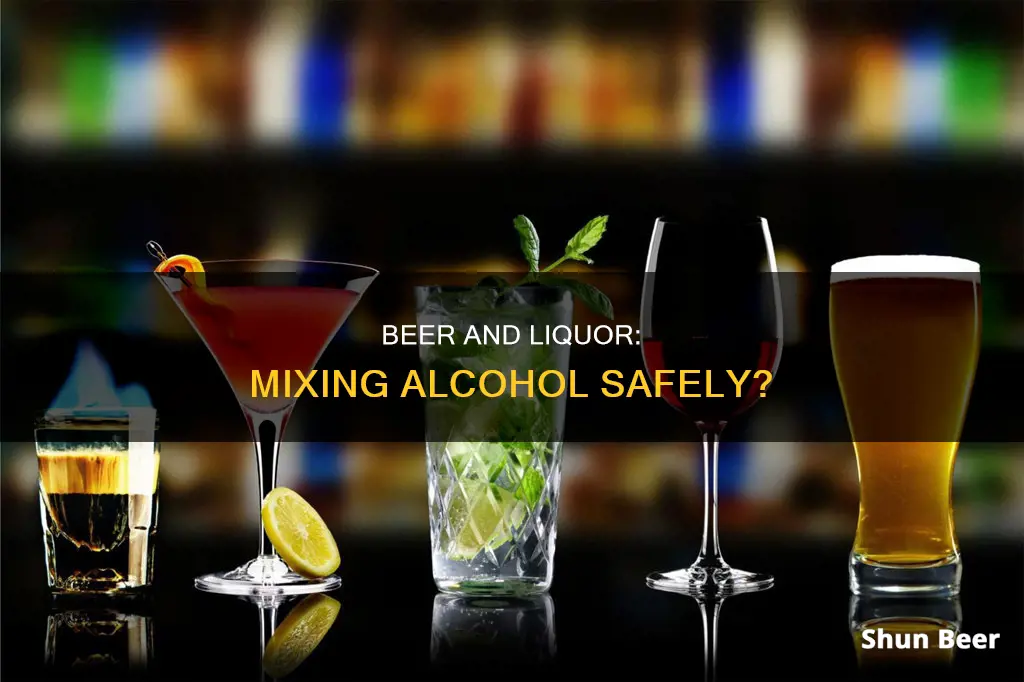
There is a common saying that goes, beer before liquor, never been sicker; liquor before beer, you're in the clear. This implies that drinking beer before liquor will make you sick and that consuming alcoholic beverages in a certain order will lessen the intensity and likelihood of a hangover. However, this is just a myth. The order in which you consume beer and liquor does not affect whether or not you will experience a hangover. The severity of a hangover is influenced by factors such as the amount of alcohol consumed, genetics, whether you ate before drinking, and how frequently you drink.
| Characteristics | Values |
|---|---|
| Drinking beer before liquor | May not make you sicker |
| Drinking liquor before beer | May not keep you clear of sickness |
| Severity of hangover | Depends on the amount of alcohol consumed, not the type |
| Severity of hangover symptoms | May be affected by compounds in alcoholic beverages |
| Severity of hangover symptoms | May be affected by drinking on an empty stomach |
| Severity of hangover symptoms | May be affected by how frequently you drink |
| Severity of hangover symptoms | May be affected by genetics |
| Severity of hangover symptoms | May be affected by congeners |
| Severity of hangover symptoms | May be affected by smoking |
What You'll Learn

The saying beer before liquor, never been sicker is a myth
The popular saying, "beer before liquor, never been sicker; liquor before beer, you're in the clear," suggests that drinking beer before liquor will make you more unwell. However, this is just a myth, and there is little scientific evidence to support it.
The phrase is based on the idea that drinking alcoholic beverages in a particular order can reduce the risk and severity of a hangover. It is often believed that drinking beer before liquor will make you sicker because liquor has a higher alcohol content. Starting with beer and then moving on to liquor is thought to spike your blood alcohol levels quickly, leading to a worse hangover.
However, modern research has debunked this myth. A 2019 study examined the effect of drinking beer and wine in different orders and combinations and found that drinking order and type of alcohol did not influence hangover severity. The amount of alcohol consumed is a more significant factor in determining the risk and severity of a hangover than the type of alcohol or the order in which it is consumed.
Other factors that can contribute to hangover symptoms include acetaldehyde, a toxic alcohol byproduct, disrupted sleep patterns, withdrawal from alcohol or other substances, and combining alcohol with other substances. Additionally, drinking on an empty stomach can worsen the side effects of alcohol consumption and increase the likelihood of a hangover.
So, if you're looking to avoid a hangover, it's not the order of your drinks that matters, but rather the total amount of alcohol you consume and whether you drink on a full or empty stomach.
Understanding Glycol Beer Chillers: How Do They Work?
You may want to see also

The amount of alcohol matters more than the type
The idea that drinking beer and liquor in a particular order will reduce the risk and severity of a hangover is a myth. The saying "beer before liquor, never sicker" is a popular phrase with unknown origins, and modern research has disproven it. A 2019 study examined the effect of beer and wine consumption in various orders and combinations and found that drinking order and type of alcohol did not influence hangover severity.
The amount of alcohol consumed has a more significant effect on hangover severity than the type of alcohol. The only way to completely prevent a hangover is to not drink alcohol or to drink in moderation. The more alcohol a person consumes, the more it accumulates in the blood, increasing intoxication. The liver can only metabolize about one drink per hour, so if there is excessive alcohol in the blood, the liver cannot speed up the detoxification process.
The standard serving of beer, wine, or spirits contains the same amount of pure alcohol (about 1/2 ounce). These amounts are dependent upon the percentage of alcohol by volume, and many beers, wines, and spirits do not follow this standard. For example, a 99ml glass of wine at 13% ABV, a 30ml measure of spirits at 42.8% ABV, or a 257ml glass of beer at 5% ABV all contain the same amount of alcohol, which is about 10g.
The alcohol in all drinks containing alcohol is the same, and it has the same effect on the body. There is no drink of moderation, only a practice of moderation. The risk of developing cancer and other health issues increases substantially the more alcohol is consumed. Therefore, it is essential to recognize that alcohol is alcohol, irrespective of its form, and to promote responsible drinking.
Expired Beer: Is It Safe to Drink After Three Years?
You may want to see also

Carbonated drinks can irritate the stomach lining, increasing alcohol absorption
The order in which alcoholic drinks are consumed does not influence the severity of a hangover. The popular saying, "beer before liquor, never sicker; liquor before beer, you're in the clear," is a myth. The severity of a hangover is determined by the amount of alcohol consumed, not the type of alcoholic beverage or the order of drinks.
However, carbonated drinks, such as beer, can irritate the stomach lining and increase alcohol absorption. The carbonation in fizzy drinks can cause digestive issues like stomach pain, bloating, and gas. The introduction of carbon dioxide into the stomach increases gastric volume, leading to feelings of fullness, bloating, nausea, and pain. Additionally, the carbonation can irritate pain receptors in the body, further intensifying these unpleasant sensations.
Carbonated drinks can also contain additives such as sugar and caffeine, which can have negative health effects, especially for those with irritable bowel syndrome (IBS). Sugary sodas, for example, are loaded with empty calories, contributing to obesity and related health risks. Artificial sweeteners in diet sodas can also have a laxative effect, leading to digestive issues.
While the carbonation in drinks like beer may not be the sole cause of a hangover, it can certainly irritate the stomach lining and increase the absorption of alcohol. This means that drinking carbonated alcoholic beverages can potentially lead to a higher blood alcohol concentration (BAC) and more intense side effects.
To reduce the risk of experiencing stomach irritation and other negative consequences, it is advisable to limit the consumption of carbonated alcoholic drinks and practice responsible drinking habits.
Parked, Drinking Beer: Legal or Not?
You may want to see also

Drinking on an empty stomach can make you absorb alcohol faster
Drinking on an empty stomach can cause alcohol to be absorbed into your bloodstream faster and increase the intensity of its side effects. Alcohol is absorbed by the small intestine more quickly than by the stomach, so drinking on an empty stomach allows much of the alcohol to pass quickly from the stomach into the small intestine, where it is absorbed into the bloodstream. This intensifies the side effects of drinking, such as difficulties with thinking and coordinating body movements.
The speed of alcohol absorption depends on several factors, including weight, age, gender, and liver health. Women, young people, and smaller people tend to absorb alcohol more quickly than men and older, larger people.
While light to moderate drinking on an empty stomach may not be a major cause for concern, drinking large amounts of alcohol quickly on an empty stomach can be very dangerous. The inability to think clearly or move the body safely can lead to serious harm or even death in extreme cases.
To avoid the ill effects of drinking on an empty stomach, it is advisable to eat at least an hour before drinking, limit alcohol consumption to one standard drink per hour, and be aware of your limits. Choosing lower-alcohol beverages, diluting drinks with water or other non-alcoholic liquids, and sipping drinks slowly can also help to lower the concentration of alcohol in your drink.
In summary, drinking on an empty stomach can cause alcohol to be absorbed into the bloodstream more rapidly, leading to intensified side effects. It is important to take precautions when drinking on an empty stomach to avoid potential negative consequences.
Stout Drinking: Bottle or Glass?
You may want to see also

Genetics play a role in hangover susceptibility
There are many misconceptions about alcohol consumption, one of the most popular being "beer before liquor, never sicker; liquor before beer, you're in the clear". This saying suggests that drinking beer before liquor will make a hangover worse. However, modern research has debunked this myth, showing that the order of consumption does not influence a hangover. Instead, the amount of alcohol consumed is the most significant factor in determining the risk and severity of a hangover.
Interestingly, genetics plays a significant role in hangover susceptibility. According to studies, genetic factors account for about 40-45% of the difference in hangover frequency in men and 40-45% in women. This means that genetics can account for nearly half of the reason why one person experiences a hangover while another doesn't, even when they consume the same amount of alcohol.
The specific genes that contribute to hangover susceptibility are yet to be identified. However, it is believed that the genes that dictate how frequently a person gets a hangover may also be related to how frequently they get drunk. This suggests that genetics may play a role in alcohol addiction, with people who are less susceptible to hangovers potentially having a higher risk for alcohol dependency.
It is important to note that environmental factors also play a role in hangover susceptibility. These factors include how quickly a person drinks, whether they eat while drinking, and their tolerance for alcohol. Additionally, other factors such as sleep patterns, alcohol withdrawal, and combining alcohol with other substances can also influence hangover severity.
Bottoms Up: How Do Self-Refilling Beer Cups Work?
You may want to see also
Frequently asked questions
No, it's not about what you drink, but how much you drink. The order in which you consume beer and liquor does not affect the severity of a hangover.
The saying is likely generations old and exists in many different languages. One hypothesis is that people tend to start their nights with lower-alcohol drinks like beer and move on to liquor, so they blame the last drink for their sickness. Another theory suggests that carbonated drinks like beer irritate the stomach lining, increasing the rate of alcohol absorption.
No, how drunk you feel depends on the total alcohol intake, regardless of the type of drink.
It is better to start with liquor and transition to beer. This is because liquor has a higher alcohol content, so starting with it will make you drink more slowly as your inhibition decreases.
The only way to completely prevent a hangover is to not drink alcohol. However, staying hydrated, drinking in moderation, and getting enough sleep can help reduce the severity of a hangover.







